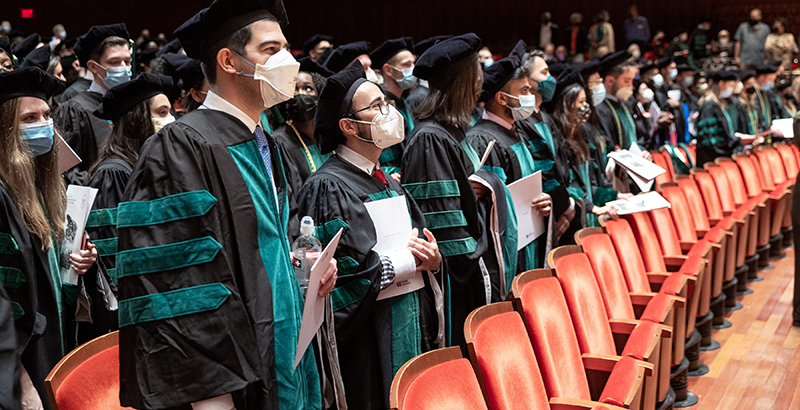
Family, faculty and alumni gathered for a Celebration of Life to honor the towering legacy of the late Carson Schneck, MD ’59, PhD ’65, a beloved Katz School of Medicine faculty member who created a pioneering curriculum for Gross Anatomy that continues to be used today.
Dr. Schneck retired from the medical school in 2012 and passed away in November 2021 at age 88. His widow, Freda, and their two daughters, Deborah Schneck Lambert and Stephanie Schneck-Jacob, MD ’87, and their families attended the program.
“You cannot discuss the history of Temple University’s School of Medicine without talking about the major contributions of Carson Schneck to the education and well-being of thousands of medical students and his constant caring and support of his colleagues,” Gerald Sterling, PhD, a pharmacologist and Professor in the Department of Biomedical Education and Data Science, told the gathering. Dr. Sterling had worked closely with Dr. Schneck for years when Dr. Sterling served as Senior Associate Dean for Education.
Dr. Schneck created an anatomy curriculum years ahead of its time that utilized dissection but abandoned lectures in favor of student self-education conferences guided by faculty members teaching in teams. Early on, he adopted a signature Socratic style in teaching the anatomy course, which is a rite of passage for first-year medical students. Remarkably, by memorizing each student’s ID card, he called upon them by name, beginning on the first day of class, every year.
He also created his own course material, the “Schneck Notes,” which still serves as the school’s anatomy text. It detailed the anatomy of every region of the body interwoven with examples of their clinical relevance. Ever humble, Dr. Schneck always referred to the material he created as “Temple Gross Anatomy Notes.” He also was instrumental in incorporating new imaging modalities — CT scans, MRIs and ultrasound — into the curriculum.
“What really made Carson a legend here at Temple was his teaching style,” said Steven N. Popoff, PhD, former John Franklin Huber Chair of the Department of Anatomy & Cell Biology and current Chair of the Department of Biomedical Education and Data Science.
“He exuded an unbridled passion for the subjects he taught and blended his unparalleled knowledge with humility and a sense of humor. His aim was to bring out the best in every student — not by fear or intimidation — but by inspiration. He was demanding and kind. Artful, humane, effective.”
Dr. Schneck received multiple Temple awards for teaching and was awarded the first national Golden Apple award and the first national Alpha Omega Alpha Distinguished Teacher Award in Basic Science. He published scholarly research, was an invited lecturer around the world on clinical anatomy and imaging and authored chapters in textbooks.
Amy J. Goldberg, MD, FACS, Interim Dean of the Katz School of Medicine, recalled that when the new medical school building was being planned in the early 2000s, there was a movement afoot in academic medicine to do away with costly dissection labs and use computer-based software instead. In the end, Temple did equip its new building with virtual tools for teaching anatomy, she said, and it also built a traditional, spacious dissection lab “because Dr. Schneck insisted students needed it.”
A former student, Michael Weizman MD ’97, of Asheville, N.C., said over the course of his 25-year career he had forgotten the names of many of the structures he had learned in Gross Anatomy, but he had no trouble remembering the critical life lessons he had learned from the master. “I’ve tried hard to be the best Family Physician I can be for my patients and their families, to keep up with the latest medical research, but I also try every day to remain humble, to maintain grace under pressure, and to maintain my humanity — just like Dr. Schneck taught me,” he said.
Dr. Stephanie L. Schneck-Jacob, a pediatric orthopedic surgeon of Wexford, PA., spoke of her father’s humble working-class background and “being a diamond in the rough” who was given a chance to shine when professors at Muhlenberg College saw in him a gifted student. “My dad always believed that no matter what their background, with proper nurturing, success was attainable for all students,” she said.
“He revolutionized, democratized, and Socratized education here at Temple just the way that [Temple University founder] Russell Conwell dreamt it. I like to believe that Temple produces some of the most caring physicians. I can’t help but believe that my father helped imprint that in all of us,” she said.
